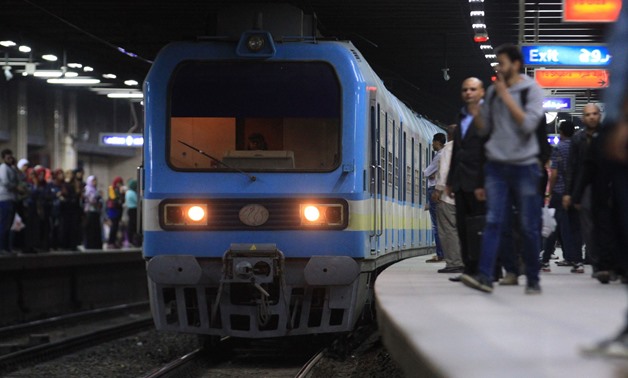
1st line of Cairo metro- Egypt Today/ Hussein Tallal
CAIRO – 17 May 2018: The new metro lines, to be established as part of the government’s plans to revamp the sector, will be managed by the private sector per new legal amendments passed by the Parliament in April.
Chairman of the National Authority for Tunnels (NAT), Tareq Gamal el-Din, told Egypt Today that the authority will establish new companies, in cooperation with the private companies, in order to help in managing ongoing subway projects.
The partnership with the private sector will help finance the to-be-opened metro lines, Gamal el-Din said, adding that “the companies to be established will be of sufficient expertise…and will be a source of revenue for the authority…which will help improve the service.”
“The National Authority for Tunnels is a service authority that receives its full budget from the state, and allocates it for metro projects. The new law will help the authority to get more revenues and will lessen the burden off the state,” Gamal el-Din explained.
The new companies will also be responsible for managing existing markets on the first two lines as well as the shopping malls that will be launched at three stations on the third metro line: Attaba, Maspiro and Manshyet el-Sadr.
“The private sector will be a main partner and will have administration authorities in these companies in order to overcome routine procedures that used to hinder investments,” added Gamal el-Din. He further said that private sector will be managing the new metro lines and their maintenance per the right of usufruct, while determining the ticket fare “will remain the government’s responsibility in order to assure affordable ticket price for citizens.”
The government decided last week to increase the fare of metro tickets to be based on the length of each commute after the underground subway system has incurred financial losses worth millions of pounds. The metro ticket price used to be fixed at L.E. 2 ($0.11) no matter how long the passenger's commute was.
Commuters will be charged a base fare of LE 3 ($0.16) for the first nine stops, and an additional LE 2 (total LE 5) for seven more stations. The highest ticket price has been fixed at LE 7 if the commuter will use the metro for more than 16 stations.
The increase has triggered anger among citizens who are currently suffering from dramatic surge in prices after the floatation of the Egyptian pound in November 2016 and two waves of fuel subsidy cuts. The move was described by the government as “necessary” to improve the service of the subway that works for 20 hours every day, assuring that discounted fares for students, elderly people and people with disabilities are still valid.
On Wednesday, President Abdel Fatah al-Sisi commented on the metro fare rise during the fifth edition of the National Youth Conference, saying "We do not have the luxury of hesitating in making the right decisions for the sake of our country. Raising the Metro ticket price is not a new decision; we have been discussing this for a long time, and we do not have any other choices."
Over 3.5 million of Greater Cairo's 21 million inhabitants rely on the metro for their daily travel, according to estimates by the country's National Authority for Tunnels (NAT).
Comments
Leave a Comment